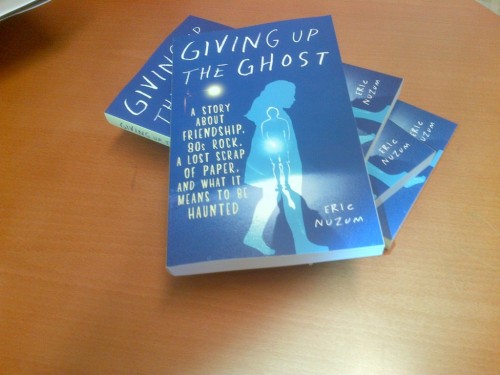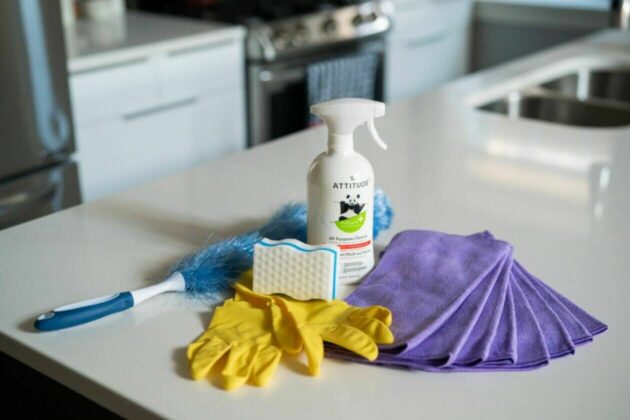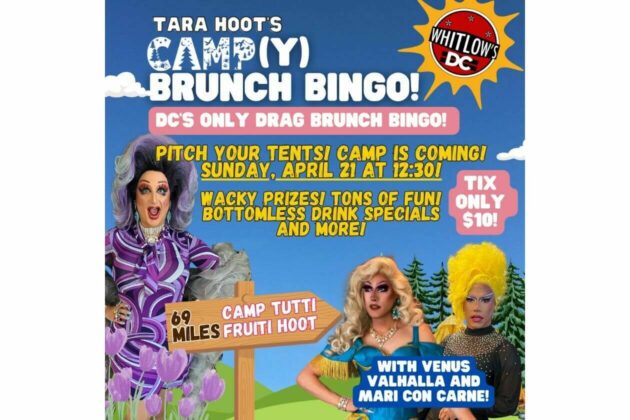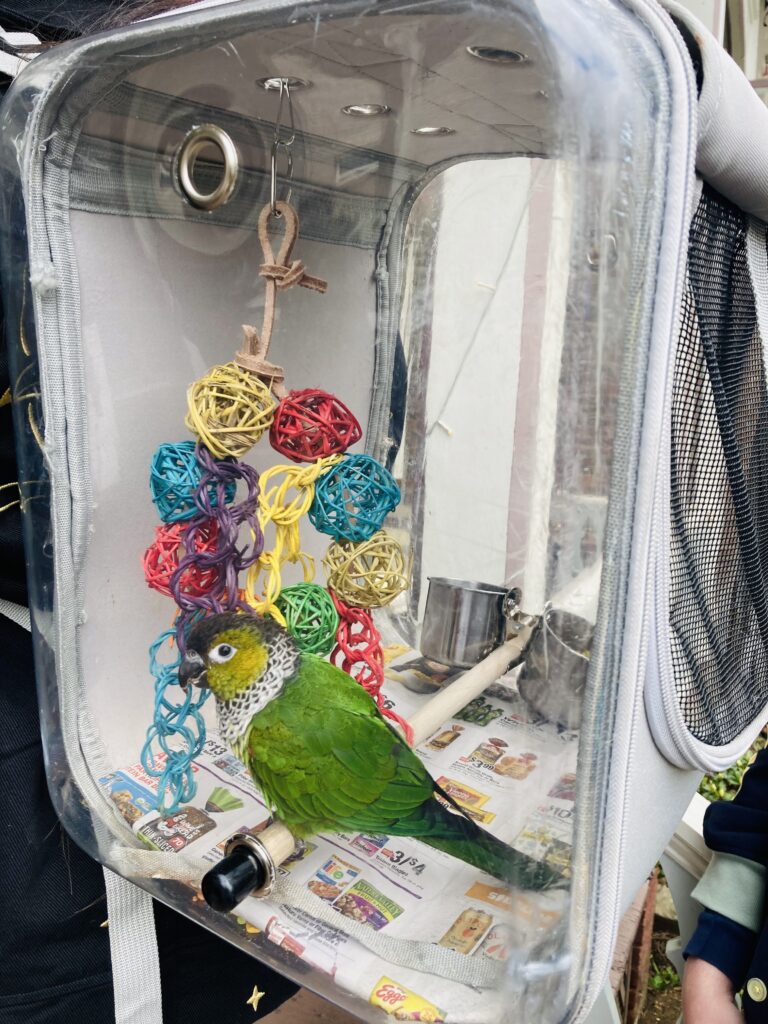
Eric Nuzum is a PoPville contributor and Petworth resident. You can catch Eric at Politics and Prose tonight at 7pm (5015 Connecticut Ave, NW.) More about Giving Up The Ghost here.
Eric says:
When writing Giving Up The Ghost I had just moved to Petworth, signed a contract to write a book about my fear of ghosts, and had absolutely no clue where to start. I mean, how do you approach telling the story of your life? Where do you start? After spending some time being terrified by what I was taking on, I sat down at my computer one night and wrote the following in one take. I wrote it first, even though it appears to have nothing to do with ghosts. But it does.
For many drafts, it sat about in the middle of the book, where it happens chronologically. But my editor convinced me that the book should open with this story, so it does.
Beer Golf
There are many ghost stories. Here’s one.
One night in June 1984, I took a girl from my high school named Laura Patterson to meet my friend Jimmy at a local miniature-golf course, the Putt-O-Links.
Putt-O-Links was located at the end of a long strip of abandoned industrial buildings outside of Canton, Ohio. Canton was once a blue-collar Mecca devoted to making vacuum cleaners, ball bearings, and steel. During the 1980s, Canton, like the entire Midwest Rust Belt, was in absolute denial that its way of life was dying right before its eyes. I don’t think globalization was even a word then, but places like Canton were already experiencing it firsthand.
Each spring the world around Putt-O-Links got smaller and smaller. One by one the nearby factories closed. Next, the car dealerships down the street moved. After that, the diner closed. Eventually, the Putt-O-Links and the ice cream stand next door were the only signs of life for half a mile in any direction. Then, that spring, the Putt-O-Links didn’t open either. Neither did the ice cream stand. There were no going out of business or thanks for thirty great years signs, just tall weeds and a fallen rusty chain that had once closed off the parking lot. It looked almost as if the owners had just forgotten that summer was coming and it was time to open again.
My friend Jimmy didn’t let Putt-O-Links’s change of fortune slow him down; he still went golfing there at least three times a week just like he had every summer. Every time I was with him, highlights of his mini-golf exploits were always part of the conversation. Jimmy and I had gone to school together for six years but were never really tight until our senior year, when it became increasingly apparent that we were both going to be “Left Behinds.” Left Behinds were those kids who weren’t visiting many college campuses or filling out a lot of admission applications. It just seemed like a waste of time. It was obvious that we weren’t going anywhere. Jimmy and I bonded because we both knew that when all our other friends left for school that fall, we’d be pretty much all we had left.
It was almost dark by the time we got to Putt-O-Links.
Continues after the jump.
“Someone broke into the storeroom and stole all the putters,” Jimmy said, pulling a decrepit set of clubs from the trunk of his car when we arrived. “But they left all the balls. I don’t get that. I mean, you could think of a lot of stuff to do with buckets of golf balls, but what could you do with all those clubs?”
I should have pointed out the hundreds of other potential uses for a golf club but decided to roll with Jimmy’s line of thought.
“What could you do with buckets of golf balls?” I asked, handing out beers.
“Umm, like, throw them at stuff,” Jimmy said with a hint of indignation. “A golf ball could even be used as a lethal weapon. It’s just like we learn in jujutsu training.”
When Jimmy wasn’t talking about mini-golf, drums, or pot, he was often talking about jujutsu. He had signed up for a twelve-week beginner’s course at the YMCA, attended four classes, then dropped out because it interfered with watching Monday Night Football. He had been plotting his triumphant return for eight months, claiming to practice on his own almost daily.
“A jujutsu student learns that almost anything can be used as a weapon when necessary,” he explained as he handed out clubs and we got set up at the first hole.
Jimmy gestured for Laura to go first. She picked a ball, lined it up, then stood frozen.
“I can’t see the hole,” she said.
“What do you mean?” I asked.
“I mean, it’s completely dark out here and I have no idea what I’m aiming at.”
“Fuck that,” Jimmy said, taking a swooping step toward the tee, swinging his club grandly and swiftly at the colored balls, sending one firing toward the side of a miniature church. The ball ricocheted off the building and buzzed past my head almost instantly, causing me to duck out of its way.
“It’s Beer Golf. Just swing and see what happens,” he said.
I should explain that Beer Golf wasn’t really a game. The name suggests some kind of wacky rule-heavy drinking game with madcap arcanery requiring players to swig every time they miss par or set their ball down without touching their elbows or something. Beer Golf was no such thing. Rather than modifying each other, the words simply described the two primary simultaneous activities. When not doing one, you did the other. It probably should have been called Beer and Golf, but Jimmy, as its originator, got to name it as well as determine the rules. Not that there were any rules to speak of, besides that Jimmy got to be master of ceremonies and determine who did what when, and who bought the beer (it was never Jimmy).
We continued through the next six or seven holes without incident. Laura was very focused on the golf part of the evening, Jimmy and I on the beer part. We played in the moonlight, laughed a lot, made fun of one another at every possible opportunity, and worked through a twelve-pack of disgustingly cheap Wiedemann beer without much effort. Jimmy was instructing us how to navigate around an empty water hazard when headlights panned across the course. They were from a car entering the parking lot. Specifically, a sheriff’s patrol car.
Outside of instinctively putting down our beers, we stood completely still as we saw an officer get out of the car, put on a wide-brimmed hat, and walk toward us, shining a flashlight in our faces.
“ I’d like some ID and a reasonable explanation of what you’re doing out here,” the deputy said.
“Oh, we just look after the place and play sometimes,” Jimmy said.
“Shut up,” I snapped, trying to keep my voice quiet enough that the deputy wouldn’t hear me.
“We just make sure that everything’s okay and nothing is busted or gets broken.”
“Jimmy,” I whispered.
“You know, some people will come in here and vandalize the place. We just make sure people know someone is out here watching it,” he continued.
“So the owners asked you to be here?” the deputy asked.
“Well, not exactly,” Jimmy replied.
“Do you even know the owners?”
“Yeah, sure. Not by name, but I came here for years,” Jimmy replied.
“So you have no consent or permission to be here, but you say you are taking care of the place,” she said. “Tell me how that works.”
Jimmy yammered on about civic duty and Good Samaritanism. After telling Jimmy to be quiet and collecting our IDs, the deputy instructed us to sit on a bench while she radioed in our info. We were told that if we got up for any reason, we would be stopped. Assuming that that involved a gun, we sat there quietly while she was in the car.
“Okay, you guys are clean,” she said on returning. “But that doesn’t mean we don’t have a serious problem.”
“Serious like what?” I asked.
“Serious like trespassing,” she said. “And theft . . . and open container . . . and destruction of property.”
“Wait,” interrupted Jimmy. “We didn’t—”
“You are playing with stolen equipment, aren’t you?” the deputy cut in. “We can tack on something else if you like.”
“Look, Officer, we obviously put no thought into what we were doing here,” Jimmy said. “It was a mistake to come here, I understand that now. I really did like the owners of this place. They used to let me clean up balls out of the hoppers to earn free games. They let me play an extra round when it wasn’t busy. I’ve spent days and days here every summer since I could walk. They were good to me. I would never do anything to disrespect that.”
The deputy inhaled deeply.
“I guess what I’m saying is that I’m sorry . . . we’ re sorry. These guys just came here because I asked them to; they have nothing to do with this.”
“You certainly haven’t done much to show your respect,” the deputy said.
“I didn’t break into that storeroom. That was someone else,” Jimmy said. “Really, we didn’t mean any harm. I guess I just come out here because it’s fun and I miss it. I don’t want to let it go.”
“I can’t just let you off,” the deputy said.
Even in the darkness, I could see a tiny sparkle in Jimmy’s eyes.
“I’ll tell you what,” Jimmy said. “How about a friendly way to settle this?” He reached into his pocket, pulled out a light blue ball, and dropped it down in front of the tee. “Let’s say I take one shot right from where that ball sits,” he said. “If I miss the hole, you can take me in and charge me with whatever you want. But if I make it in one shot, then you let us go and we promise never to come back here again.”
The deputy stared at Jimmy. Then she looked at the hole, illuminated by the headlights of her patrol car. There were two empty water hazards with a ten-inch strip of loose Astroturf between them, then a slope down to the green, which had a small cement ditch surrounding the edges. The ball was way off to the side of the rail next to the tee. It would be difficult, if not impossible, in daylight, sober, and without the threat of prosecution hanging over his head.
“One shot?” she said.
“One shot,” Jimmy replied.
“What the hay,” the deputy said. “Let’s see you give it a try.”
“So we have a deal?” Jimmy asked.
“You don’t have nothing if you don’t hit a hole in one,” she replied.
Jimmy nodded to the deputy and got into position behind the ball. He broke his concentration once to ask me to move out of the light. He moved his head and eyes back and forth down the fairway several times, exhaled loudly, then slowly and fluidly swung his club forward.
The ball rolled precisely down the middle of the two water hazards, swooped down the slope, took a slight hop as it entered the putting green, and landed directly in the cup with a deliberate and distinct plastic plop.
“Fucking hell,” I said, letting out a bit of a laugh before I realized that none of the others were making any noise. We just stood there for a moment staring at one another.
“Would you like to try, Officer?” Jimmy asked.
We all stood there staring at the deputy; she was looking Jimmy right in the eye.
“I’m going to go down to Maggiore’s to get a can of iced tea,” she said. “I’m going to be gone for about ten minutes. When I come back, there will be no sign of you or you ever even being here. Anything you took or moved will be put back where it belongs. If you are here when I get back, I will charge you with everything I can think of. And if I ever drive by this place, which I do several times a week, and I see you here, there won’t be any more golfing contests. You will go to jail. Do you hear me?”
“Yes, Officer,” Jimmy said. “Thank you.”
“Okay then, get out of here,” she said, turning back to her patrol car.
As we saw the car’s taillights head down the road, I dropped to the ground and screamed, Laura started jumping up and down, and Jimmy just stood there smiling.
“Jimmy, how the fuck did you do that?!?” I yelled.
“Dude, I golf here three times a week. I can’t remember the last time I didn’t get a hole in one on that hole. Now get me a beer before I steal your wallet and your girlfriend and go buy some more.”
We were so excited by Jimmy’s amazing performance that we stood around drinking and talking for probably another half hour, almost forgetting that we had to leave before the deputy came back. Then we rushed through our goodbyes and headed off into the night.
Here’s the thing about the story I just shared, the thing that makes it feel like a ghost story.
I’m the only one left to tell it.
I often warn people about being my friend, for two reasons. First, I’m a lousy friend. I forget birthdays. I can’t remember their kids’ names. I don’t recall where they just went on vacation or what my friends’ husbands/wives/lovers do for a living.
The second reason is that a lot of my friends end up dead. I have seen a disproportionately large number of my friends die at young ages. Steve and Scott died of AIDS. Tim, Connor, and another guy named Tim all from various forms of cancer. Drugs took Dan, Monica, and a third guy named Tim. Brad, Meghan, Jim, and Sherry all died in auto accidents. My friend Doug destroyed his liver and died of alcohol poisoning. I don’t even want to think about the ones who died from suicide. You name a path to an early grave, and I’m sure I have some young formerly alive friend who followed it. I’ve even had a few friends who died with no one quite certain how or why, they just did. Regardless, I’ve seen more than my fair share of untimely deaths. It’s left me with a lot of questions. I wonder about what happened to all of them after life. I worry about who will remember their experiences and stories, right their wrongs, and carry on what was important to them. I think about how their lives and deaths are supposed to affect and change me. An unfortunate consequence of this high body count is that when I look back at the friends who’ve had the most influence on who I’ve become, I realize that most of them are gone.
One in particular: Laura. Most of this book is the story of my friendship with Laura and what happened to each of us before and after our evening of Beer Golf.
When I started writing about this time in my life, particularly my friendship with Laura, I wanted to look up Jimmy, to see what he was up to. After a small amount of digging, I found out that Jimmy had died a few years earlier, a heart attack at age thirty-nine. He left behind a wife and kid.
The sheriff’s deputy aside, that means I am the only one who is here to remember that night at the Putt-O-Links.
For me, it’s almost impossible to recall these old stories without experiencing the pain of losing those who are no longer around to tell them themselves. I think of Laura and Jimmy and I miss them.
They are some of my ghosts.
I have a lot of them—ghosts, that is.
That’s not even counting my “real” ghost.
Assuming, of course, that my real ghost was actually real.
Recent Stories

Unlike our competitors, Well-Paid Maids doesn’t clean your home with harsh chemicals. Instead, we handpick cleaning products rated “safest” by the Environmental Working Group, the leading rating organization regarding product safety.
The reason is threefold.
First, using safe cleaning products ensures toxic chemicals won’t leak into waterways or harm wildlife if disposed of improperly.

Looking for something campy, ridiculous and totally fun!? Then pitch your tents and grab your pokers and come to DC’s ONLY Drag Brunch Bingo hosted by Tara Hoot at Whitlow’s! Tickets are only $10 and you can add bottomless drinks and tasty entrees. This month we’re featuring performances by the amazing Venus Valhalla and Mari Con Carne!
Get your tickets and come celebrate the fact that the rapture didn’t happen during the eclipse, darlings! We can’t wait to see you on Sunday, April 21 at 12:30!
Frank’s Favorites
Come celebrate and bid farewell to Frank Albinder in his final concert as Music Director of the Washington Men’s Camerata featuring a special program of his most cherished pieces for men’s chorus with works by Ron Jeffers, Peter Schickele, Amy
Cinco de Mayo Weekend @ Bryant Street Market
SAVE THE DATE for Northeast DC’s favorite Cinco de Mayo celebration at Bryant Street NE and Bryant Street Market!
Cinco de Mayo Weekend Line up:
Friday, May 3:







